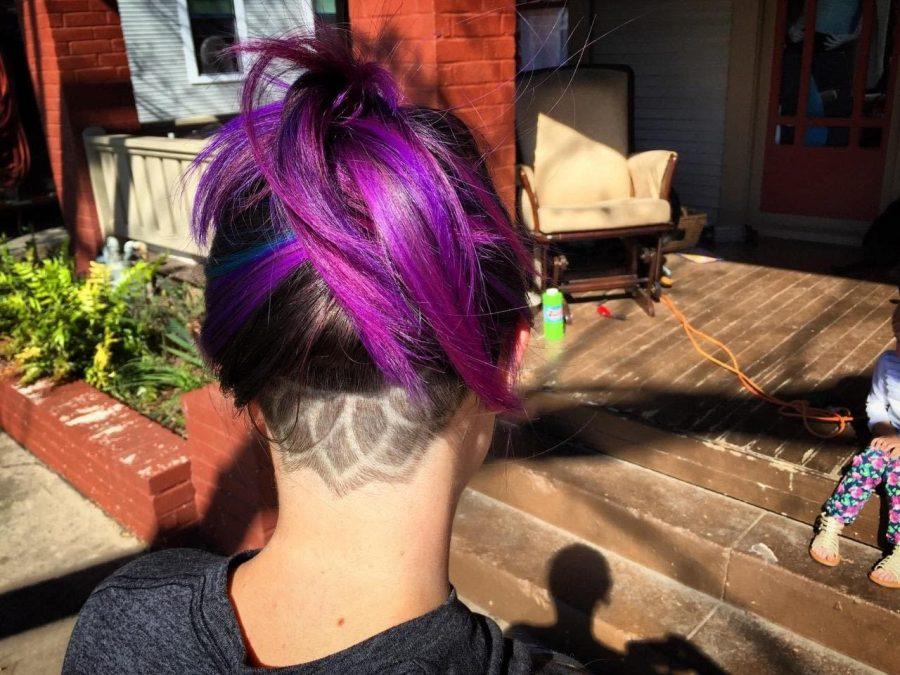Colored hair has popped into Fort Worth to stay as more and more young people embrace the modern hair trend and color their hair with vivid colors like bright pink, green, blue, and even grey to express their individuality.
One of those people is Emily McDermott, a 29-year-old senior English major and mom, who said she colors her hair to express her personality. “For me it was about self-expression,” McDermott said. “Probably the same reason people get tattoos.”
McDermott said she believes people still stereotype those with colored hair despite the growing trend and acceptance.
“It’s more associated with hipster now than punk rock,” she said. “And the older you are the more your judged, especially if you’re a mom.”
McDermott, who has been coloring her hair since she was 19, said she has noticed an increase in judgmental reactions to her hair since she has gotten older, and she gets the most judgmental looks when she is with her daughter Molly or at church.
“Sometimes when my husband and I attend the morning service at The First Methodist Church, in downtown Fort Worth, we get a lot of awkward stares,” she said.
McDermott, who has green, purple, and pink highlights, said she always gets one of two reactions.
“One, why would you do that? And two, I love it,” she said. “Although, I am use to it now.”
McDermott said she believes creativity and self-expression go hand and hand and America as a culture sees itself as full of individuals. Yet there are many restrictions on expressing yourself, especially with colored hair.
Dr. Sarah Roche, assistant professor of marketing at Texas Wesleyan, said America is such an individualistic society that Americans often focus on ways to differentiate ourselves.
In fact, according to a recent study by Dove, 70 percent of woman alter the state of their hair.
“I mean, that almost makes it a norm,” Roche said. “This trend is probably being pushed down by pop culture, not to mention all the self-help videos on how to do it on You Tube and social media.”
The study by Dove revealed that eight in 10 women feel pressured to wear their hair a certain way. Which is why Dove is trying to break this stigma and encourage woman to express their selves through their hair.
And according to the sociology of hair, woman use their hair to establish both as a group identity and as a form of everyday resistance from social norms established by dominant culture.
Taylor Norrid, co-owner of Panther City Salon and a stylist for six years, said there has been an increase in clients wanting vivid, unnatural colors put in their hair.
“We have more and more clients coming into our salon to get fashion colors put in their hair,” Norrid said. “It’s definitely becoming more mainstream and accepted in the DFW area. I have one client with bright pink and green hair who is a nurse at John Peter Smith Hospital.
Twenty percent of the clientele at Panther City Salon comes in to get vivid fashion colors added to their hair, Norrid said.
“We have about six to eight girls who come in to get these colors added a week,” she said. “Our biggest concern is to educate our clients about the cost and maintenance with these colors.” Norrid said she believes the older people, like younger people, are becoming more accepting of the new hair trend.
But are people still quick to make judgement upon those with colored hair or do they understand its greater purpose of self-expression?
David Monge, coordinator for student organizations and Greek life, said he colored his hair grey for fun.
“I was bored during winter break,” said Monge, 33. “For me it wasn’t that deep it was just for fun. I haven’t experienced life any differently being a male with colored hair.”
However, Jeremy Pena, a 26-year-old switch technician at Ericsson, said he has experienced stereotyping and negative criticism from others due to his colored hair.
“I love my hair but sometimes I feel like people judge me because I am a guy,” he said.









![Pippin, played by Hunter Heart, leads a musical number in the second act of the musical. [Photo courtesy Kris Ikejiri]](https://therambler.org/wp-content/uploads/2025/04/Pippin-Review-1200x800.jpg)
![Harriet and Warren, played by Trinity Chenault and Trent Cole, embrace in a hug [Photo courtesy Lauren Hunt]](https://therambler.org/wp-content/uploads/2025/02/lettersfromthelibrary_01-1200x800.jpg)
![Samantha Barragan celebrates following victory in a bout. [Photo courtesy Tu Pha]](https://therambler.org/wp-content/uploads/2025/05/20250504_164435000_iOS-834x1200.jpg)





![Hunter Heart (center), the play's lead, rehearses a scene alongside other student actors. [Photo courtesy Jacob Sanchez]](https://therambler.org/wp-content/uploads/2025/04/thumbnail_IMG_8412-1200x816.jpg)
![Student actors rehearse for Pippin, Theatre Wesleyan's upcoming musical. [Photo courtesy Jacob Rivera-Sanchez]](https://therambler.org/wp-content/uploads/2025/04/Pippin-Preview-1200x739.jpg)
![[Photo courtesy Brooklyn Rowe]](https://therambler.org/wp-content/uploads/2025/05/CMYK_Shaiza_4227-1080x1200.jpg)

![Lady Rams softball wraps up weekend against Nelson Lions with a victory [6 – 1]](https://therambler.org/wp-content/uploads/2025/04/Screenshot-2025-04-04-100924-1200x647.png)
















